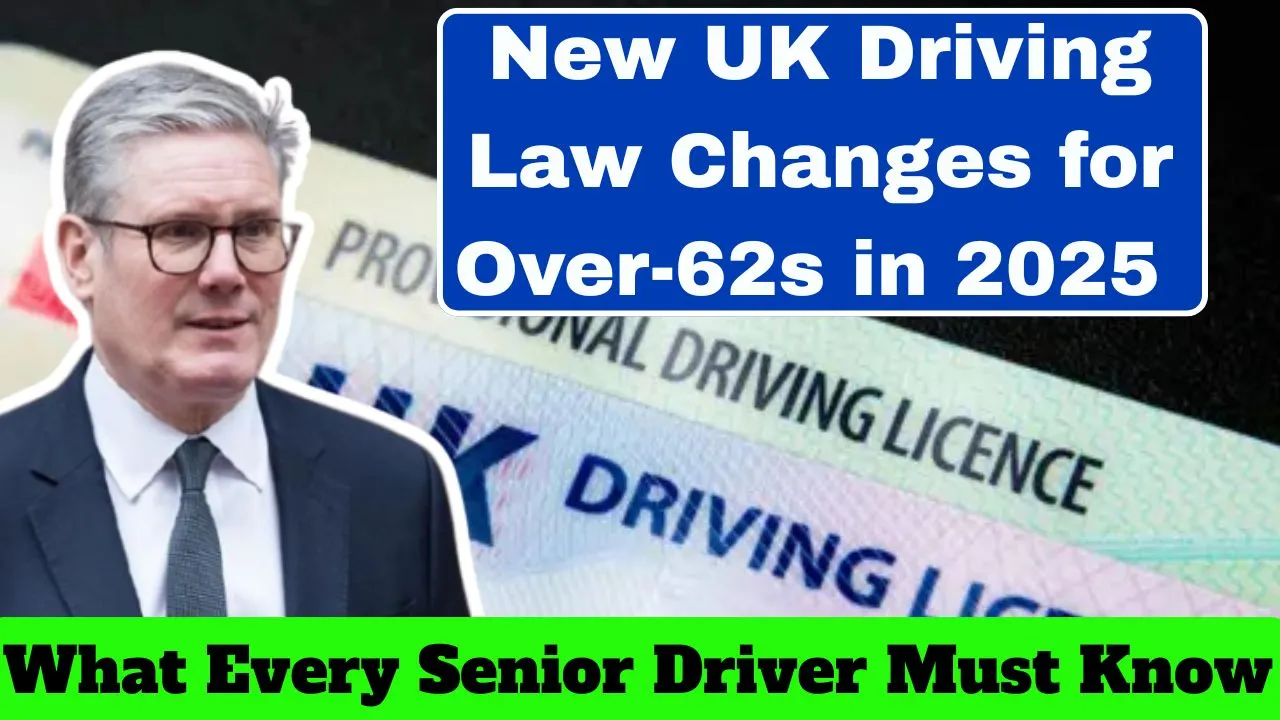If you’re over 62 or approaching that age, you need to pay attention: the UK Driving Law Changes 2025 are gearing up to bring new rules around health checks, vision, and licence renewal. These updates could directly affect your ability to drive, how often you renew, or what documentation you’ll need to submit.
In this post, I’ll lay out the UK Driving Law Changes 2025 clearly: what the government is proposing, who it impacts, what you must do, and how to stay compliant. Read on to make sure you stay on the road without surprises.
What the UK Driving Law Changes 2025 Mean for You
The UK Driving Law Changes 2025 are not just a few small policy tweaks. They represent a major shift in how older drivers are assessed, monitored, and approved to stay on the road. For drivers over 62, the new rules could mean earlier renewals, more medical checks, and even driving restrictions based on health or vision. Whether you’re in great shape or managing a condition, it’s important to understand how these changes affect you. Staying informed now can help you avoid licence suspension, fines, or problems with insurance later on. This section breaks down the key changes and what they mean in practical terms.
UK Driving Law Changes 2025 – What’s on the Table
Before diving deeper, here’s a summary of the major proposals and how they compare to current rules:
| Aspect | Current Rule | Proposed Change | Effect on Over‑62s |
| Medical & health declarations | Self‑declare serious conditions at renewal | Mandatory full medical declarations for many, possibly GP assessment | More scrutiny and documentation needed |
| Vision / eye test | Must meet minimum eyesight, but no regular test mandated | Proof of recent eye test required during renewal | You’ll need optometrist records |
| Licence renewal cycle | Licence renewed every 10 years (until age 70), then every 3 years | For over‑62s with health flags, more frequent renewal cycles | More frequent renewals |
| Conditional licences | Typically full licence if fit | Conditional licences (e.g. daylight driving only) may be imposed | More limits based on health evaluation |
| Insurance / compliance | Standard renewal and declarations | Insurers may require declarations or medical proof | You may face higher scrutiny or premium changes |
These proposals, drawn from recent reports about changes for senior licence holders, reflect growing concern about safety as drivers age.
Medical & Health Declarations
One of the biggest shifts under the UK Driving Law Changes 2025 is stricter medical rules. Under the new proposals, drivers aged 62 and older could be required to submit full medical declarations when renewing. Conditions like heart disease, neurological problems, diabetes, stroke history, or cognitive decline may need to be declared. In some cases, a GP assessment or medical report will be required.
This means if you already have a chronic condition, or even borderline issues, gather your medical records now. Be ready: late or missing disclosures could lead to refusal of renewal or licence suspension.
Vision / Eye Test Requirements
Driving safely depends heavily on vision. Under current rules, you need to meet minimum eyesight standards (like reading a number plate), but there is no mandated, routine eye test for all senior drivers.
With the new proposals, over‑62s may need to submit proof of a recent eye test at licence renewal. If you use glasses or have had eye surgery (like cataract removal), you may have to present documentation confirming your vision is within acceptable limits. This extra step ensures continuous vision safety checks, but also adds another document to prepare before renewal.
Renewal Frequency & Conditional Licences
Currently, many drivers renew their licence every 10 years until age 70, then every 3 years. Under the proposed changes, over‑62s with health flags may need a shorter renewal cycle—perhaps every 3 years or even more often. Licences could also become conditional, with limits such as only driving during daylight, no motorway use, or restricted miles, depending on the health evaluation.
If renewal is missed or checks fail, your licence could be suspended, and driving without a valid licence can nullify your insurance.
Impact on Insurance & Compliance
With new health and vision checks will come increased interaction with insurance providers. Insurers might ask for medical proof or vision reports before renewing coverage. Failing to declare relevant health conditions could invalidate your policy.
Your compliance with DVLA requirements becomes more critical. Disclose health changes in time, maintain records, and don’t skip renewals. The new rules may bring additional paperwork, but they aim to better align driving fitness and safety.
What You Can Do Now
- Review your medical history and get recent reports from your GP
- Schedule an eye test so you have proof for renewal
- Mark your licence renewal dates in advance—don’t wait until the last minute
- Check your insurer’s policy on health disclosure and renewals
- Stay informed through official DVLA announcements
- Explore whether local authorities will support conditional licences or alternative mobility options
Final Thoughts
The UK Driving Law Changes 2025 are likely to bring stricter health and vision checks, more frequent renewals, and possible licence restrictions for drivers over 62. While these adjustments may feel intrusive, they aim to improve safety and accountability on the road.
If you’re over 62 or soon will be, now is the time to prepare: get your medical and eye records in order, track your renewal dates, and stay informed about final DVLA decisions. If you tell me your region (England, Scotland, Wales, or Northern Ireland), I can check exactly how it applies to your area and help you plan.
FAQ
No. The requirement seems to apply mainly when health issues or flags exist. Many may only need to self‑declare or present medical records.
No. These changes do not require a full retest but add health, vision, and renewal scrutiny.
If you are flagged for health issues, your renewal may come every 3 years or more frequently.
Yes, conditional licences (for example, daylight hours only) may be used if your evaluation shows limitations.
The proposals focus on UK-wide DVLA rules, but implementation may vary by nation. Always check your region’s licensing body







